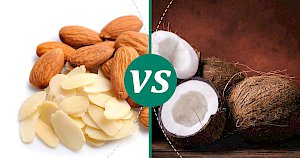Coconut vs Almond Flakes: Calories & Nutrition Showdown


Coconut vs Almond flakes
Nutrition Facts
Serving size:
change
5g10g15g20g30g40g50g60g80g100g120g140g160g180g200g220g250g300g350g400g450g500g600g700g800g900g1000g
1oz2oz3oz4oz5oz6oz7oz8oz10oz12oz15oz20oz25oz30oz35oz40oz50oz
Amount Per Serving:
Serving size:
change
5g10g15g20g30g40g50g60g80g100g120g140g160g180g200g220g250g300g350g400g450g500g600g700g800g900g1000g
1oz2oz3oz4oz5oz6oz7oz8oz10oz12oz15oz20oz25oz30oz35oz40oz50oz
Amount Per Serving:
Coconut vs Almond Flakes 100g Compare
| per 100g | Coconut | Almond flakes |
|---|---|---|
| Calories | 354 | 590 |
| Carbohydrates | 15.23 g | 18.67 g |
| Fat | 33.49 g | 52.52 g |
| Dietary fiber | 9 g | 9.9 g |
| Protein | 3.3 g | 21.4 g |
| Calcium | 14 mg | 236 mg |
| Iron | 2.43 mg | 3.28 mg |
| Magnessium | 32 mg | 268 mg |
| Phosphorus | 113 mg | 49 mg |
| Potassium | 356 mg | 659 mg |
| Sodium | 20 mg | 19 mg |
| Zink | 1.1 mg | 49 mg |
| Vitaminium B1 (Thiamine) | 0.066 mg | 0.191 mg |
| Vitaminium B2 (riboflavin) | 0.02 mg | 0.711 mg |
| Vitaminium B3 (Niacin) | 0.54 mg | 3.5 mg |
| Vitaminium B6 | 0.054 mg | 0.115 mg |
| Vitaminium B9 (Folic acid) | 26 mg | 0.049 mg |
| Vitaminium E | 0.24 mg | 23.75 mg |
Discover the Wonders of Coconut and Almond Flakes
When it comes to adding a delightful crunch and a nutritional boost to our meals, coconut and almond flakes stand out as two popular choices. Both of these flakes not only enhance the flavor and texture of various dishes but also come with their own set of fascinating benefits. Let’s embark on a journey to explore these two remarkable ingredients, uncovering their unique qualities and how they compare in the culinary world.
A Closer Look at Coconut Flakes
Coconut flakes are more than just a tasty topping; they are a treasure trove of nutritional benefits and culinary versatility. Originating from the dried, shredded flesh of the coconut, these flakes carry a hint of sweetness and a burst of tropical flavor that can elevate any dish. Coconut flakes are renowned for their high fiber content, beneficial fats, and a moderate amount of carbohydrates, making them a fantastic option for those looking to add texture without compromising on health.
The Allure of Almond Flakes
Almond flakes, on the other hand, are sliced, blanched almonds that boast a delicate nutty flavor and a satisfying crunch. Almonds are celebrated for their impressive nutritional profile, including a high protein content, healthy fats, and an abundance of vitamins and minerals. Almond flakes can transform a simple dish into a nutrient-dense meal, contributing to heart health, weight management, and overall well-being.
Comparing the Nutritional Profiles
When we dive into the nutritional data, it’s clear that both coconut and almond flakes have their unique advantages. Coconut flakes are lower in calories, with 354 calories per 100 grams, compared to almond flakes, which have 590 calories. This makes coconut flakes a lighter option for those mindful of their calorie intake. However, almond flakes stand out with their higher protein content of 21.4 grams, making them an excellent choice for muscle repair and growth.
Both types of flakes are rich in dietary fiber, with almond flakes slightly leading at 9.9 grams compared to coconut's 9 grams, aiding in digestion and satiety. Almond flakes also have a higher content of essential minerals such as calcium, magnesium, and potassium, which are vital for bone health, muscle function, and blood pressure regulation.
Culinary Uses and Versatility
Coconut and almond flakes both offer a wide range of culinary uses, from baking and cooking to garnishing and snacking. Coconut flakes bring a sweet, tropical twist to cakes, cookies, and granolas, while almond flakes add a nutty, crunchy texture to salads, yogurt, and oatmeal. The choice between coconut and almond flakes ultimately depends on the flavor profile and nutritional needs of the dish.
Final Thoughts
Both coconut and almond flakes are versatile, nutrient-rich ingredients that can enhance the flavor, texture, and nutritional value of your meals. Whether you prefer the tropical sweetness of coconut flakes or the nutty crunch of almond flakes, incorporating these ingredients into your diet can contribute to a balanced and healthy lifestyle. So why not experiment with both and discover your personal preference?
Coconut 100g
354kcalCalories source
- 16% CARBS.
- 4% PROTEIN
- 80% FAT
Almond flakes 100g
590kcalCalories source
- 12% CARBS
- 14% PROTEIN
- 75% FAT
Compares of coconut
- Coconut vs Almonds
- Coconut vs Brazil Nuts
- Coconut vs Cashew Nuts
- Coconut vs Macadamia Nuts
- Coconut vs Peanuts
- Coconut vs Pecan
- see all compares of coconut
Marcin Piotrowicz
calories-info.com creator
Healthy diet and healthy lifestyle promoter
Add comment